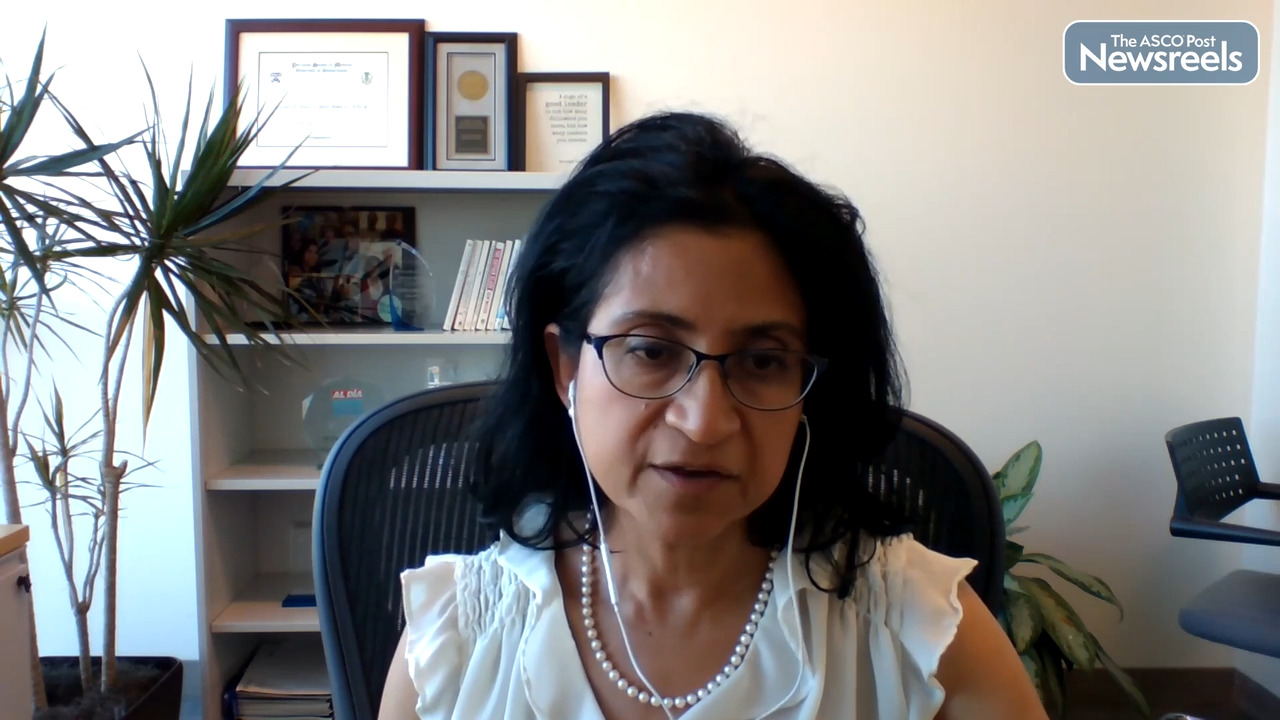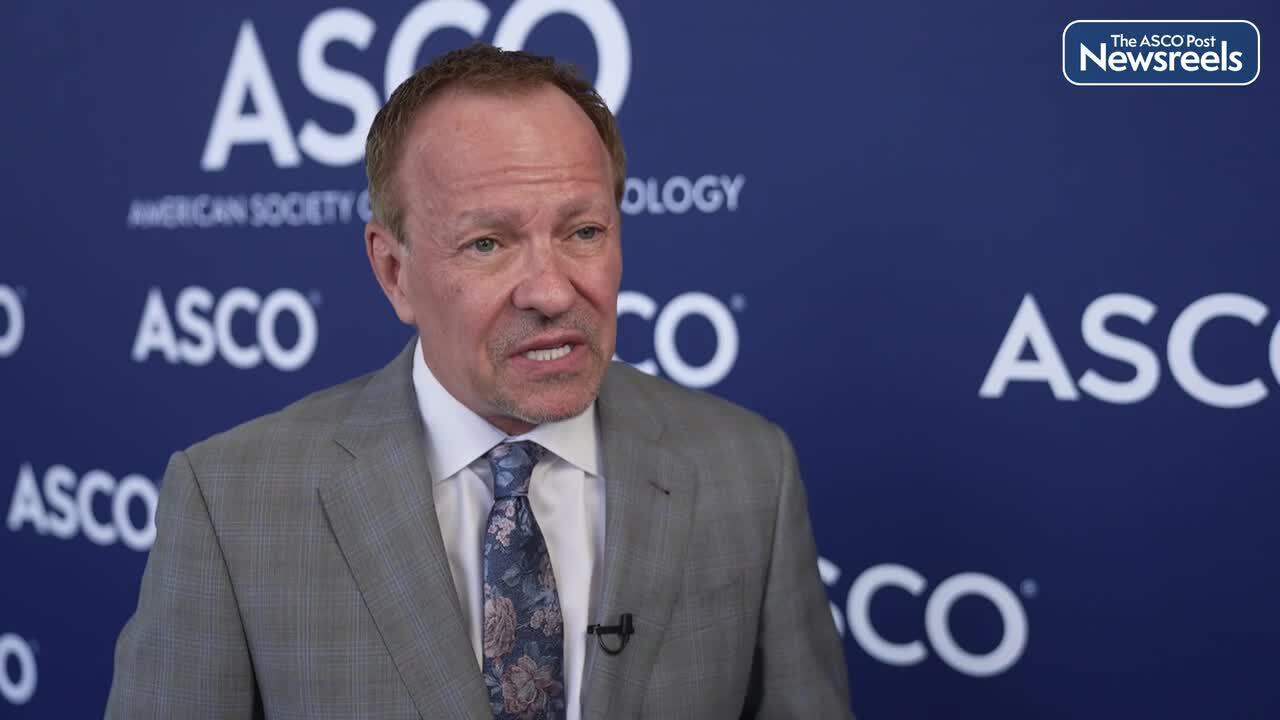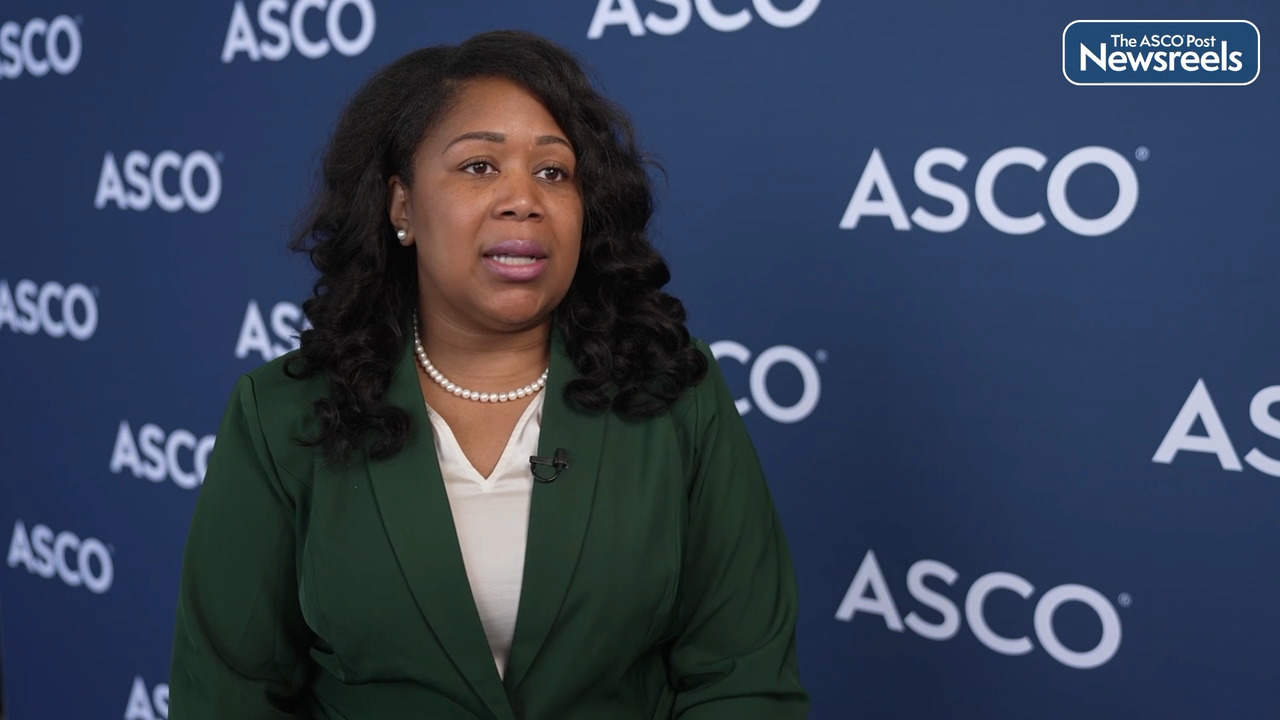James Chih-Hsin Yang, MD, PhD, on Metastatic Nonsquamous NSCLC: Evaluating Pemetrexed and Platinum With or Without Pembrolizumab
2023 ASCO Annual Meeting
James Chih-Hsin Yang, MD, PhD, of the National Taiwan University Hospital and National Taiwan University Cancer Center, discusses the latest data from the phase III KEYNOTE-789 study, which evaluated the efficacy and safety of pemetrexed plus platinum chemotherapy (carboplatin or cisplatin) with or without pembrolizumab in the treatment of adults with EGFR tyrosine kinase inhibitor–resistant, EGFR–mutated, metastatic nonsquamous non–small cell lung cancer (NSCLC) (Abstract LBA9000).
Transcript
Disclaimer: This video transcript has not been proofread or edited and may contain errors.
James Chih-Hsin Yang:
Patients who had EGFR mutation, stage four non-small cell lung cancer, the standard of care is tyrosine kinase inhibitors as a first line. When they fail, they have to receive chemotherapy as a standard of care. KEYNOTE-789 is a randomized phase three study, testing whether adding pembrolizumab to the standard chemotherapy is going to help overall survival and progression-free survival.
492 patients who are randomized into two arms. One, pembrolizumab plus end of care chemotherapy versus chemotherapy plus placebo. The co-primary endpoints were progression-free survival and overall survival. There were three interim analysis. Progression-free survival time were done at the interim analysis two.
The hazard ratio was 0.8, which nearly touched the statistical significant P value of boundary 0.0117 and therefore miss the endpoint. The overall survival endpoint was done at the interim analysis three, which was then final analysis 42 months after the last patient's randomized. The overall survival hazard ratio was 0.84, was also statistically not significant.
We also look at the pathological and clinical factors. We try to figure out whether patients with different characteristics can benefit from pembrolizumab adding to chemotherapy. Unfortunately, there was only one factor that seems to help these patients, which is PD-L1 status. Patients who had PD-L1 more than 1%, which is close to 50% of the population, the hazard ratio for overall survival was 0.77. Where those patients who did not have PD-L1 expression, their hazard ratio for overall survival was 0.91. So, we had a study that we cannot change the standard practice, yet the finding that PD-L1 status may help us to choose a patient when asked for future study.
Related Videos
The ASCO Post Staff
Carmen E. Guerra, MD, MSCE, of the University of Pennsylvania Abramson Cancer Center, discusses three key abstracts presented at ASCO: strategies to increase accrual of underrepresented populations in Alliance NCTN trials, how patient-clinician education can strengthen partnerships and improve diversity in breast and lung cancer trials, and mediators of racial and ethnic inequities in clinical trial participation among U.S. patients with cancer from 2011 to 2022 (Abstracts 6509, 6510, 6511).
The ASCO Post Staff
Bradley J. Monk, MD, of the University of Arizona, Phoenix, and Creighton University, discusses phase III findings from the KEYNOTE-826 study of overall survival results in patients with persistent, recurrent, or metastatic cervical cancer. Study participants received first-line treatment of pembrolizumab plus chemotherapy, with or without bevacizumab, which reduced the risk of death by up to 40% in three different subsets of patients (Abstract 5500).
The ASCO Post Staff
Catherine C. Coombs, MD, of the University of California, Irvine, discusses prolonged pirtobrutinib therapy, which continues to demonstrate a safety profile amenable to long-term administration at the recommended dose without evidence of new or worsening toxicity signals. The safety and tolerability observed in patients on therapy for 12 months or more were similar to previously published safety analyses of all patients enrolled, regardless of follow-up (Abstract 7513).
The ASCO Post Staff
Claire Roddie, PhD, MBChB, of University College London, discusses results of the FELIX study, which showed that the second-generation chimeric antigen receptor (CAR) T-cell therapy obecabtagene autoleucel is safe for adults with relapsed or refractory B-cell acute lymphoblastic leukemia, even those with a high burden of disease. This agent yielded high rates of complete response and ongoing CAR T-cell persistence in most patients whose disease responded (Abstract 7000).
The ASCO Post Staff
LaQuisa C. Hill, MD, of Baylor College of Medicine, Houston Methodist Hospital, discusses study findings showing that CD5 chimeric antigen receptor (CAR) T cells may induce clinical responses in heavily treated patients with relapsed or refractory T-cell acute lymphoblastic leukemia. Manufacturing CD5 CAR T cells with tyrosine kinase inhibitors seemed to improve their potency and antitumor activity (Abstract 7002).





